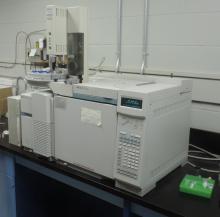
Having worked previously at our partner community college teaching Fundamentals of Chemistry (a one-semester introductory chemistry course with lab for non-science majors) and with science majors that transfer over upper division university courses, I have noticed that due to circumstances beyond their control they typically have very limited exposure to instrumentation- whether that be previous experience in high school, socially (doesn't really come up in everyday conversation), and sometimes even during their first few years in college (at least in regards to modern instrumentation). Also, to compound this community college faculty (and even with my non-tenure track position at a university) have a large, time-consuming teaching load.
So what would be a useful infrastructure to help us modernize labs and perhaps give science students more experience/skills- especially those serving student populations with low socio-economic status? I would imagine some sort of instrumentation grant from a federal agency such as the National Science Foundation (NSF). Unfortunately, that won't happen because the current focus for anything involving instrumentation is on research- whether that be undergraduate research, as in specific research projects with students, or course-based undergraduate research experiences (CUREs).
Now I am all in favor of getting students involved in research and research projects. In particular I emphasize this heavily in my upper division ecology lab and as a final project in my biochemistry lab courses. But it is from these experiences that I see this often does not fit or thrive well with a majority of my students who have no interest in research (and/or no talent) for it. It took me a while to finally accept what the data showed and that was that most of my students just want a job when they graduate (over 70%). Most of those jobs (for those with bachelor degrees) want graduates who can be trained to operate various instrumentation safely, consistently, and efficiently. These businesses often don't have an overall scientific question they are addressing, or they employ someone at a higher pay scale to handle more complicated technology issues.
In talking with my chemistry (and biology) colleagues at the community college they don't have time, administrative support, and are often a bit burned out with high teaching loads to write a grant to develop and subsequently implement CUREs. Plus, it is almost like it would be putting the cart before the horse- they would just be happy to get tstudents access to modern instrumentation to see, use, and familiarize themselves with it without additional distractions. A new instrument is a major new concept to even grasp and then you want to throw in research ideas?
Back several years ago I asked a NSF program officer about how to get instrumentation and was snapped at for suggesting just an idea and that I should lobby "my institution to fund these needs or threaten to not offer classes or even quit and find another job." Part of this strategy, although noble in nature, doesn't work if your administration doesn't value these endeavors or tenured positions. In other words I can be fired and replaced. The other part of that strategy is a bit extreme and I (as well many others) have the two-body problem for jobs. At a conference I talked with another faculty member at a different institution (that served low income students at a major metropolitan city) and they expressed frustration with NSF for seeming to be missing this mark as well.
So my wish list, if anyone is listening (perhaps like the NSF), is to bring back these types of grants so that institutions like ours (lack of administrative support, high teaching load, and serving large groups of students from low socio-economic status) can at least attempt to develop in students a basic standard of scientific readiness.

All comments must abide by the ChemEd X Comment Policy, are subject to review, and may be edited. Please allow one business day for your comment to be posted, if it is accepted.
Comments 1
Same here!
Hi Francisco - I struggle with this too! I want to include more CUREs but with little time or resources to do so. We tried an ATE grant and partnership with a university but we were denied. Any further progress on your end?
Our institution is working on adapting our gen chem program to include more elements of CUREs with an air quality monitoring project. The instruments used for the air quality aren't as expensive as a GCMS and students still get some experience with the concepts of instrumentation. Just a thought to share some ideas on how to get more research experiences in the curriculum while living within our means.